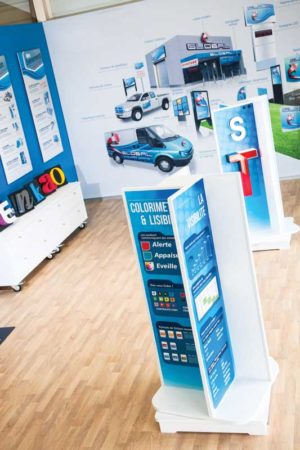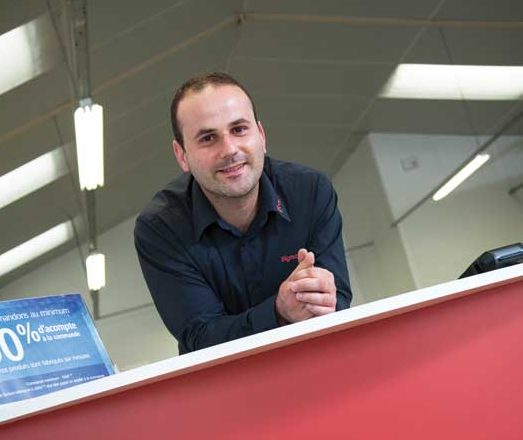
Photos courtesy Gestion Per-Lac
By Pierre Lachapelle
Over the past few years, many independent sign shop owners have reassessed their position in an ever-changing and highly competitive marketplace. If they are no longer able to clearly define their target market, name their direct competitors or position themselves strategically within the industry, especially, it may be time to revisit their approach.
For some, taking this opportunity to review their business model leads them to join a franchise system, such as Signarama, Image360, FastSigns International, Signs Now or Speedpro Imaging. As an ultra-rapid consolidation of the industry continues to disrupt traditional ways of doing business among independent sign and graphics companies, more and more of them—along with print service providers (PSPs), marketing agencies, copy centres and other industry stakeholders from a variety of backgrounds—are joining forces with major franchisors to take advantage of corporate synergies and a multitude of services offered by larger, nationally and internationally integrated franchise networks.
There are many options open to them, but one that has become an increasingly important trend—both in Canada and elsewhere—is the conversion of existing sign shops into franchised businesses.
Converting or co-branding
Some franchisors have developed specialized programs to attract owners of existing sign and print shops as new franchisees by converting their businesses to operate under their national or international franchise brands. The franchisors benefit through royalty payments, while the signmakers or PSPs benefit from the help and support of a new partner in their business. Even when these shops already have a solid client base, after all, their owners may recognize the need to grow by diversifying their offerings, differentiating themselves within their local market and better positioning themselves to improve their overall business performance.
To respond to new market challenges, some simply convert their business into a franchise, while others opt for co-branding, whereby the franchise brand is added to their own. While both of these approaches have already been taken for decades in other sectors, they are still relatively new to sign shops and PSPs. With profit margins constantly being squeezed, however, and the growing need to improve operations and marketing performance, it is no wonder many independent sign business owners are now considering franchising as a development strategy.

“Since converting my business, I am better-organized and better-structured,” says franchisee Jonathan Doleans, “and this has translated into an increase in sales of more than 25 per cent!”
The benefits of membership
The advantages have quickly become clear. Industry statistics show sign shop franchisees consistently saw their business grow by between 6.65 and 16.9 per cent in 2014, for example, and were poised for additional, record-setting momentum in 2015 and 2016.
Certainly, taking advantage of a proven business system—while remaining the boss—can be an effective route for owners of sign businesses with fewer than 10 employees. Very few companies of this size are otherwise able to meet the multiple challenges of excelling in sales, marketing, administration and day-to-day operations. Implementing a conversion and adhering to a franchise system allows even the smallest business to benefit, as a team of specialists at the corporate level is working every day to improve the entire franchise network’s competitive edge. And while the notion of converting or co-branding may be new, many of these franchise systems are not, having built a solid reputation over the course of decades of success. (By way of example, FastSigns celebrated its 30th anniversary in 2015, while Signarama, Signs Now and Signs By Tomorrow all did the same in 2016.)
In addition to an operations system that has been proven at a national or international level, the major competitive benefits of joining a franchise network include a comprehensive web and direct marketing strategy, ongoing training and group purchasing power. In fact, converting a sign shop into a franchise with a major brand often provides access to entirely new suppliers and products, which in turn allows the owner to diversify his/her service offerings to clients.
“Since converting my business, I am better-organized and better-structured,” says Jonathan Doléans, a Signarama franchisee based in Le Mans, France, “and this has translated into an increase in sales of more than 25 per cent!”
In another example, the first business in Quebec to take advantage of Signarama’s conversion program was Absolu Graphique, which joined in 2013. As a franchise, the business experienced massive growth, doubling its sales in less than three years.





